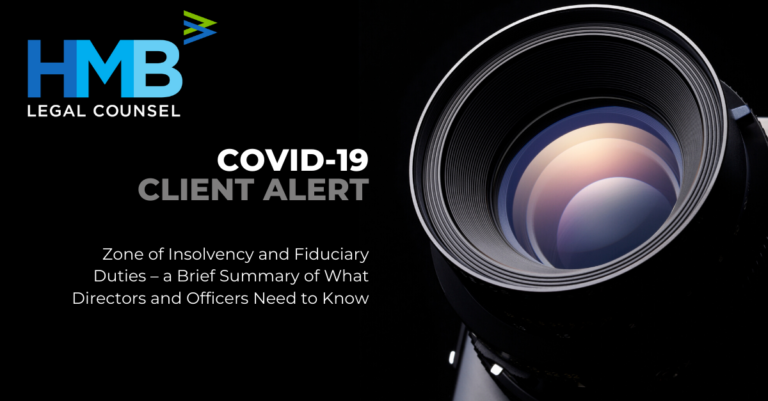The outbreak of the COVID-19 pandemic has impacted businesses and commercial relationships worldwide. As commercial operations continue to be shuttered and revenues cut off, principals of companies will likely find themselves questioning where their obligations and responsibilities lie when the entity’s solvency is questionable. When a corporation is solvent, the fiduciary duties of the corporation's board of directors run to the corporation's stockholders and the board's decision-making process is protected by the application of the business judgment rule. When insolvent, however, the fiduciary duties of directors and officers run primarily to the company’s creditors. During these times, tough decisions need to be made and you need to ensure that you are protected by general principals of corporate governance.
Read More- The business judgment rule still applies. This rule is that boards and officers of a company are presumed to be acting in “good faith”—that is, within the fiduciary standards of loyalty, prudence, and care owed to the company and shareholders. Absent evidence that the officer or director has blatantly violated some rule of conduct, a court will not review or question the decision.
- Just because a company is insolvent doesn’t require it cease operations or liquidate. In the oft-cited Delaware Trenwickcase, the court held that “even when a firm is insolvent, its directors may, in the appropriate exercise of their business judgment, take action that might, if it does not pan out, result in the firm being painted in a deeper hue of red.” 2006 WL 2434228 at *3.
- One does need to be wary of fiduciary duty principals (e. when directors or officers are shareholders and take actions that could be deemed a breach of duties to creditors) and fraudulent conveyance laws.
- “Deepening Insolvency” is no longer a valid Delaware cause of action. (Generally, speaking, “deepening insolvency” refers to the “injury to the debtor’s corporate property from the fraudulent expansion of corporate debt and prolongation of corporate life.” Official Comm. of Unsecured Creditors v. R.F. Lafferty & Co., 267 F.3d 340, 347 (3d Cir. 2001).)) Additionally, the Seventh Circuit has repeatedly declined to punish corporate officers under this “controversial” theory for decisions made in failed attempts to save insolvent companies from bankruptcy. Fehribach v. Ernst & Young LLP, 493 F.3d 905, 908 (7th Cir. 2007); see also Schacht v. Brown, 711 F.2d 1343 (7th Cir. 1983).
If you have concerns about the solvency of your company and need help navigating the decision-making process, HMB’s attorneys have extensive experience and can assist. We have both prosecuted and defended numerous breach of fiduciary duty claims against principals of distressed companies and can safely guide you through the process.
The ongoing issues related to the spread of the Coronavirus (COVID-19) have had and will continue to have a significant impact on individuals, families, businesses and markets. Visit our collection of resources providing guidance during these fast-changing circumstances. Please reach out to your lead team member to answer specific questions.





